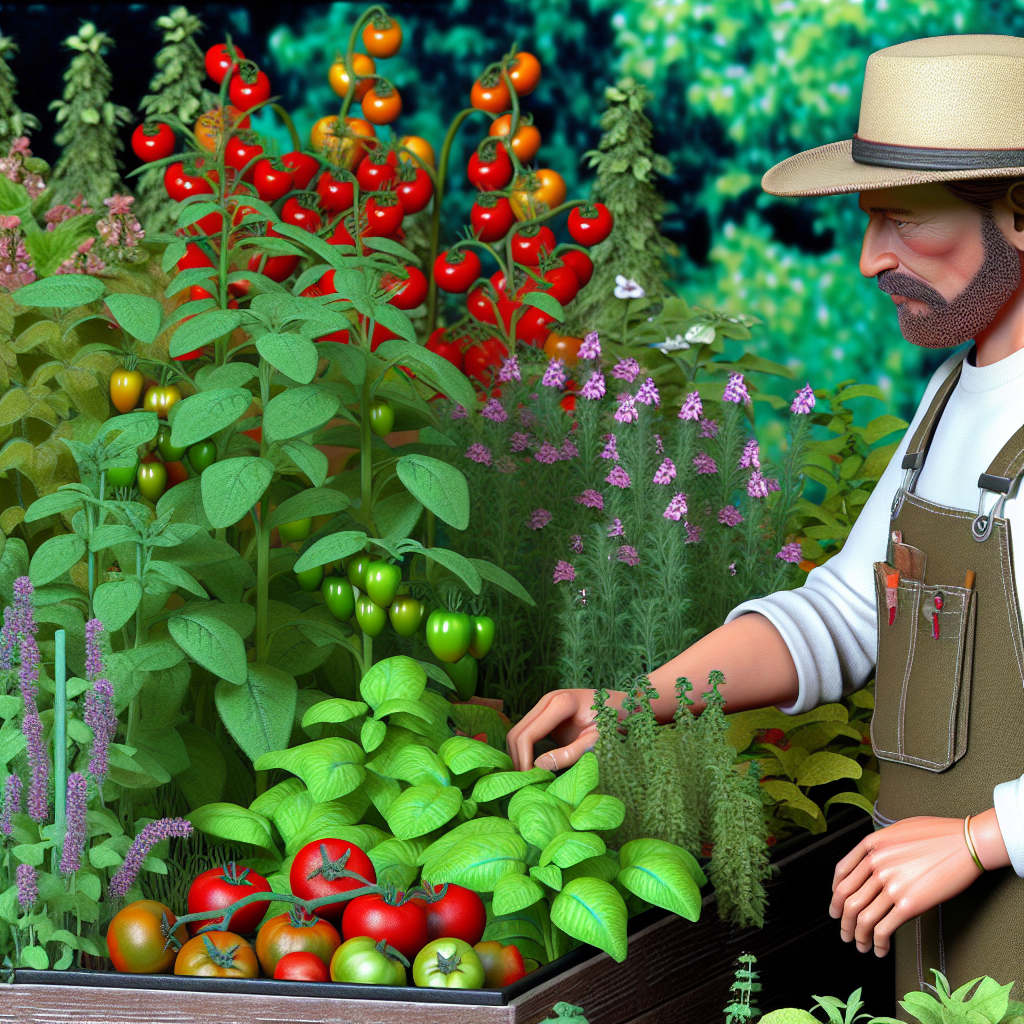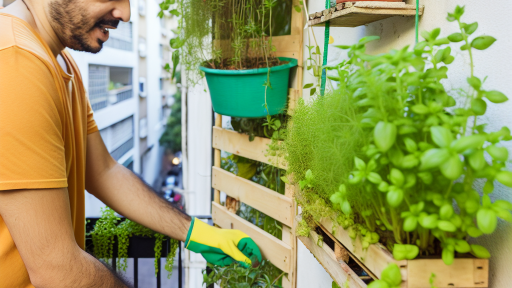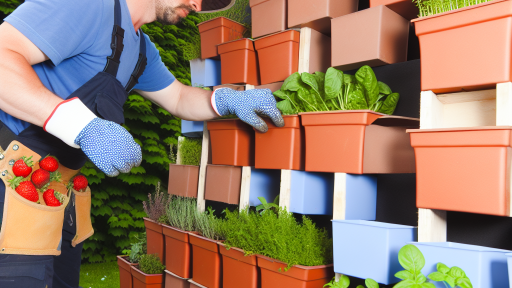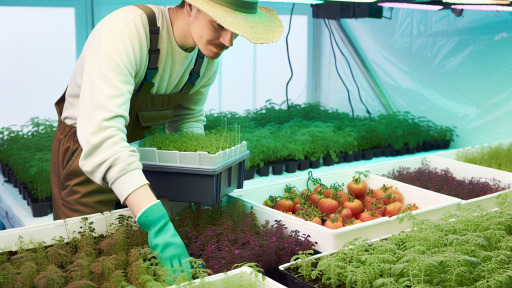Maximizing Space Utilization
Container gardening allows for efficient use of limited land on small farms.
This method utilizes vertical space effectively.
Farmers can grow various plants in a compact setup.
Additionally, containers can be placed in various locations.
They can fit on patios, balconies, or even rooftops.
This flexibility helps maximize growing areas.
Containers can also help manage soil quality better.
Farmers can control the soil conditions for each plant.
As a result, plants can thrive regardless of ground quality.
Moreover, gardens can be more aesthetically pleasing.
Diverse container styles allow for creative arrangements.
This approach can enhance the visual appeal of small farms.
Another advantage is that containers can reduce weed growth.
Using raised containers can minimize weed competition.
This reduces the need for herbicides or manual weeding.
Transform Your Agribusiness
Unlock your farm's potential with expert advice tailored to your needs. Get actionable steps that drive real results.
Get StartedFinally, small farmers benefit from improved accessibility.
Containers can be placed at manageable heights for maintenance.
This makes it easier for farmers to tend their crops.
Soil Management and Quality Control
Effective Soil Type Management
Container gardening allows for the selection of specific soil types.
This customization leads to better growth conditions for plants.
Gardeners can mix and match soil blends for each container.
Tailored soil mixtures enhance nutrient availability.
Additionally, they improve drainage and aeration.
Quality Control Over Soil Conditions
Containers provide a controlled environment for soil quality.
Growers can monitor moisture levels more easily.
Regular testing for pH and nutrient levels is simplified.
This proactive approach helps in maintaining optimal conditions.
Furthermore, it reduces the risk of soilborne diseases.
Mobility and Flexibility in Gardening
One major benefit of container gardening is mobility.
Gardeners can relocate containers to maximize sunlight exposure.
This adaptability allows for seasonal changes in plant placement.
Moreover, it facilitates pest and disease management strategies.
Moving plants can also help prevent overcrowding issues.
Resource Efficiency and Conservation
Container gardening promotes efficient use of resources.
It allows for targeted watering practices.
Growers can focus on specific containers needing attention.
This method conserves water and reduces waste.
Additionally, it enables better composting practices in small areas.
Water Conservation
Container gardening simplifies irrigation management significantly.
Showcase Your Farming Business
Publish your professional farming services profile on our blog for a one-time fee of $200 and reach a dedicated audience of farmers and agribusiness owners.
Publish Your ProfileThis method allows for more precise control over water usage.
Consequently, gardeners can reduce water wastage effectively.
Efficient Watering Techniques
Using containers enables targeted watering strategies.
For instance, drip irrigation can be easily implemented.
This technique minimizes evaporation and runoff.
Additionally, self-watering containers help maintain moisture levels.
Soil Health Improvement
Container gardening can enhance soil moisture retention.
Well-aerated soil holds water more efficiently.
This feature supports plant growth while minimizing water needs.
Climate Adaptability
Containers can be relocated to optimize sun exposure.
This flexibility contributes to better water efficiency in varying climates.
Moreover, gardeners can position containers closer to water sources.
Reducing Watering Frequency
With improved soil retention, watering frequency decreases.
This adjustment saves time and resources for farmers.
Consequently, gardeners enjoy lower maintenance efforts.
Promoting Sustainable Practices
Water-efficient gardening methods promote sustainability.
Gardeners contribute to conservation efforts with responsible practices.
Employing container gardening reduces overall water consumption.
Explore Further: Preserving Heirloom Seeds On Your Farm
Pest and Disease Management
Isolation from Pests
Container gardening effectively isolates plants from ground pests.
This physical separation reduces the chances of infestations.
Gardeners can easily monitor plants for signs of pest activity.
Additionally, removing affected plants is much simpler.
Reducing Disease Transmission
Container gardening minimizes the risk of soil-borne diseases.
Consequently, disease spread between plants is less likely.
Using fresh potting soil in containers promotes healthier growth.
Furthermore, gardeners can sterilize soil between plantings.
Control Over Growing Conditions
Containers allow precise control over soil moisture and drainage.
This control directly impacts plant health and resilience.
Adjustments can be made quickly in response to environmental changes.
Moreover, using high-quality soil improves plant strength.
Natural Pest Deterrents
Gardeners can easily incorporate companion planting in containers.
For example, planting marigolds can deter certain pests.
Additionally, using organic pest control methods is feasible in containers.
This approach promotes a healthier growing environment overall.
Ensuring Early Detection
Plants in containers are easier to inspect regularly.
Gardeners can spot early signs of distress more readily.
This proactive approach allows for immediate intervention.
Thus, maintaining a healthy garden becomes more achievable.
Accessibility for Maintenance
Container gardens can be placed at convenient heights.
Showcase Your Farming Business
Publish your professional farming services profile on our blog for a one-time fee of $200 and reach a dedicated audience of farmers and agribusiness owners.
Publish Your ProfileThis arrangement simplifies routine maintenance tasks.
Moreover, physically accessible plants encourage regular care.
Consequently, plants remain healthier over time.
Discover More: Enhancing Soil Health Through Seed Propagation
Seasonal Flexibility
Container gardening offers farmers remarkable seasonal flexibility.
Farmers can easily move plants to adapt to changing weather conditions.
During extreme heat, containers can be relocated to cooler areas.
This movement protects plants from heat stress.
Similarly, in case of frost, plants can be brought inside.
This simple action reduces the risk of frost damage significantly.
Moreover, container gardens can utilize microclimates effectively.
Farmers can place containers in sheltered spots for added protection.
This strategy promotes healthier plant growth throughout the seasons.
Adaptation to Weather Changes
Weather conditions can change rapidly, affecting crops adversely.
Container gardening allows immediate reaction to these changes.
Farmers can rearrange plants based on current weather forecasts.
This adaptability not only preserves plants but also improves yields.
Thus, adjusting the location of containers enhances productivity.
Utilizing Indoor Spaces
Using containers allows farmers to maximize indoor growing space.
Spaces like porches, garages, or sunrooms become viable options.
These areas can be utilized to extend the growing season.
Furthermore, growing indoors protects plants from pests and diseases.
This results in healthier plants and a more abundant harvest.
Enhanced Plant Variety
Container gardening increases the variety of plants grown on small farms.
Farmers can explore options that they wouldn’t typically cultivate.
This diverse planting can enhance soil health and pest resistance.
Additionally, it provides farmers with more choices for market sales.
Ultimately, variety can lead to increased income opportunities.
You Might Also Like: Building a Profitable Organic Garden Business

Diverse Crop Production
Variety of Plants
Container gardening allows farmers to grow numerous plant types.
This adaptability enhances crop diversity on small farms.
Farmers can cultivate herbs, vegetables, and flowers all in one space.
Furthermore, different containers suit various plant needs.
Seasonal Flexibility
Gardeners can adjust their crops seasonally with ease.
This flexibility encourages year-round planting efforts.
For instance, leafy greens thrive in cooler months.
Meanwhile, tomatoes and peppers flourish in warmer conditions.
Optimized Space Usage
Containers maximize available space effectively.
This method reduces wasted areas in small farms.
Vertical gardening techniques can further optimize space.
Showcase Your Farming Business
Publish your professional farming services profile on our blog for a one-time fee of $200 and reach a dedicated audience of farmers and agribusiness owners.
Publish Your ProfileAdditionally, it allows for creative arrangements in limited areas.
Enhanced Control Over Growing Conditions
Farmers can regulate soil quality and nutrients in containers.
This level of control contributes to healthier plant growth.
Moreover, containers protect plants from pests and diseases.
Farmers can monitor moisture levels easily in each pot.
Urban Farming Opportunities
Container gardening is ideal for urban environments.
It enables city dwellers to grow their own food.
This practice promotes sustainability in densely populated areas.
Additionally, it fosters community engagement through shared gardens.
You Might Also Like: Managing Nutrients In Container Farming Systems
Accessibility
Ergonomic Benefits
Containers can be elevated to minimize bending and stretching.
This feature significantly reduces strain on the farmer’s back.
As a result, gardening becomes an easier task for everyone.
Customizable Arrangements
Farmers can arrange containers based on their needs.
This adaptability allows for personalized gardening layouts.
Moreover, it enhances overall productivity on the farm.
Space Utilization
Container gardening effectively maximizes limited space.
Farmers can utilize vertical gardening techniques with stacks.
This method increases the number of plants per square foot.
Accessible for All Age Groups
Gardening in containers is suitable for all ages.
Older farmers can enjoy gardening without physical strain.
Even children can participate easily with manageable tasks.
Mobility and Flexibility
Containers can be moved to brighten up shadowy areas.
Farmers can easily relocate plants based on seasonal changes.
This flexibility allows for better sunlight exposure.
Aesthetic Appeal
Enhancing Visual Appeal
Container gardens add a splash of color to small farms.
These gardens create inviting spaces for visitors.
Moreover, they offer a flexible design option for unique layouts.
Various plant choices enhance the farm’s overall look.
Attracting Visitors
An aesthetically pleasing environment draws more visitors.
People are naturally attracted to vibrant and well-kept gardens.
This interest can lead to increased foot traffic and sales.
Furthermore, stunning container gardens can inspire budding gardeners.
Creating Focus Areas
Container gardening allows the creation of distinct focus areas on a farm.
These areas can serve as resting spots for guests.
Additionally, they can highlight specific plants or themes.
Vivid arrangements encourage guests to explore and enjoy the space.
Seasonal Variation
Container gardens allow seasonal variation in displays.
This offers fresh looks at different times of the year.
Farmers can change plants according to seasons or holidays.
Showcase Your Farming Business
Publish your professional farming services profile on our blog for a one-time fee of $200 and reach a dedicated audience of farmers and agribusiness owners.
Publish Your ProfileSuch diversity keeps the farm dynamic and exciting.
Additional Resources
Are backyard food gardens better or worse for the environment than …




